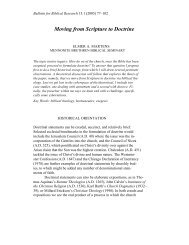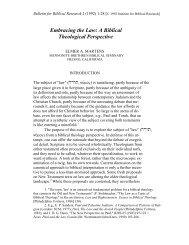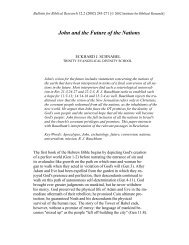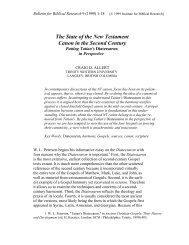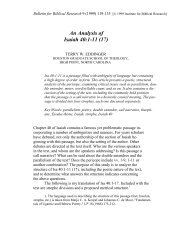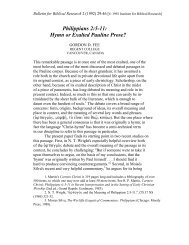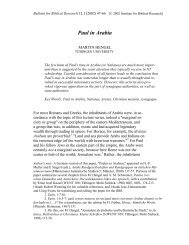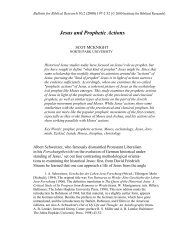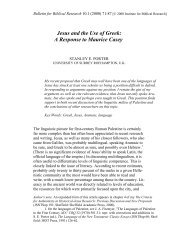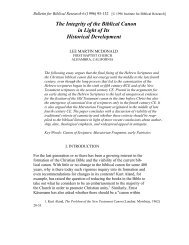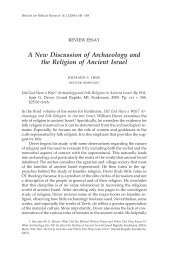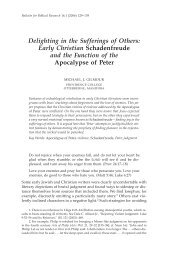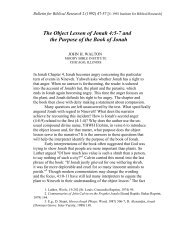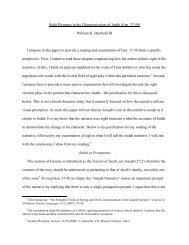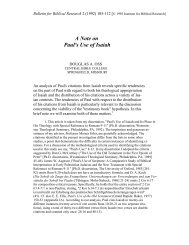Beyond the Grave - Institute for Biblical Research
Beyond the Grave - Institute for Biblical Research
Beyond the Grave - Institute for Biblical Research
Create successful ePaper yourself
Turn your PDF publications into a flip-book with our unique Google optimized e-Paper software.
BLOCK: Ezekiel's Vision of Death and Afterlife 141<br />
it remained <strong>for</strong> his successors to develop a clearer picture of an es-<br />
chatological individualized revivification. 142<br />
CONCLUSION<br />
It is remarkable that as recently as 1985 biblical scholars were still<br />
maintaining that "in ancient Israel <strong>the</strong>re was no belief in a life after<br />
death." 143 Many believe that <strong>the</strong> Pharisaic acceptance of <strong>the</strong> doctrine<br />
(see Acts 23:6-9) derives from a limited number of late texts which<br />
reflect Persian influence, and that <strong>the</strong> Sadduceans, who rejected <strong>the</strong><br />
notion, were <strong>the</strong> true heirs of Old Testament belief. It is encouraging<br />
to see that some have reversed <strong>the</strong> roles of <strong>the</strong>se two parties and are<br />
now insisting that <strong>the</strong> Sadducean position represented a conscious<br />
departure from both Hebrew and common Semitic beliefs. 144<br />
In his oracles against Egypt and in his vision of <strong>the</strong> resuscitated<br />
dry bones, Ezekiel offered his countrymen powerful declarations of<br />
hope. There is life after death, and <strong>the</strong>re is hope beyond <strong>the</strong> grave.<br />
Yahweh remains <strong>the</strong> incontestable Lord, not only of <strong>the</strong> living, but<br />
also of <strong>the</strong> dead. He alone determines <strong>the</strong> moment and nature of a<br />
person's decease. He alone has <strong>the</strong> keys to <strong>the</strong> gates of Sheol, and he<br />
faces no challenge from Mot or any o<strong>the</strong>r chthonic power. In this re-<br />
gard Ezekiel, like all o<strong>the</strong>r orthodox Yahwists, distances himself<br />
from <strong>the</strong> prevailing notions of his day. But this vision of resuscita-<br />
tion of dry bones is not only <strong>for</strong> <strong>the</strong> nation of Israel. It holds out hope<br />
<strong>for</strong> all who offer <strong>the</strong>mselves to Yahweh in covenant commitment.<br />
With good reason we who are heirs of <strong>the</strong> glorious message of <strong>the</strong><br />
prophets and apostles may find in this text a dramatic affirmation<br />
that <strong>the</strong> sting of death may—nay, it will be overcome by <strong>the</strong> ani-<br />
mating power of Yahweh's Spirit. After all, as Ezekiel had wit-<br />
nessed, and as he had heard on dozens of occasions, <strong>the</strong> Lord is<br />
Yahweh. He has spoken. He will make good his word.<br />
of Ezekiel's Vision," p. 10). While Ezekiel 37 may represent a determinative moment<br />
<strong>for</strong> <strong>the</strong> Old Testament belief in <strong>the</strong> resurrection of <strong>the</strong> dead (cf. E. Haag, "Ez 37 und<br />
der Glaube an die Auferstehung der Toten," Trierer <strong>the</strong>ologische Zeitschrift 82 [1973]<br />
78-92), contra many (e.g., R. Hanson, The Method and Message of Jewish Apocalyptic<br />
[OTL; Philadelphia: Fortress, 1964] 368), it is highly unlikely that this passage provides<br />
<strong>the</strong> first reference to <strong>the</strong> resurrection of <strong>the</strong> dead in Hebrew literature.<br />
142. Cf. R. A. Muller, "Resurrection," ISBE (rev. ed.) 4.145-50.<br />
143. J. H. Neyrey, "Eternal Life," Harper's Bible Dictionary (ed. P. J. Achtemeier;<br />
San Francisco: Harper & Row, 1985) 282. Cf. <strong>the</strong> reaction to this statement by Lang,<br />
"Life After Death in <strong>the</strong> Prophetic Promise," 144.<br />
144. B. Lang, Mono<strong>the</strong>ism and <strong>the</strong> Prophetic Minority (Sheffield: JSOT Press, 1983)<br />
25; idem, "Life After Death in <strong>the</strong> Prophetic Promise," 144-45 (cf. his citation of o<strong>the</strong>r<br />
scholars who have come to similar conclusions).



